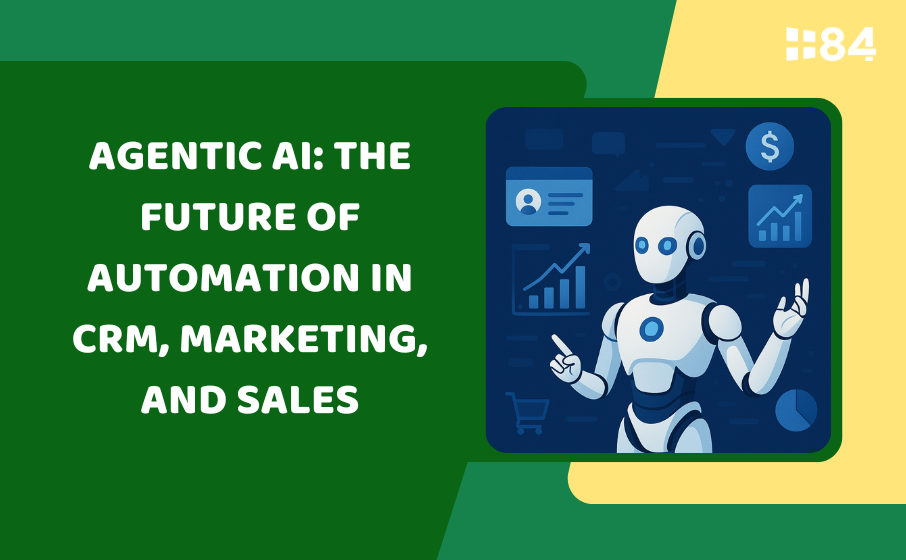In the digital era, artificial intelligence (AI) is infiltrating every corner of the business world—from customer relationship management (CRM) and marketing automation (MA) to sales force automation (SFA). A new player, however, is emerging on the scene, promising a more intelligent form of automation: Agentic AI. But what exactly is Agentic AI, and how is it set to transform the game?
This article demystifies Agentic AI and explores its role in CRM, MA, and SFA—helping businesses stay ahead of the latest technological trends.
What Is Agentic AI?
Agentic AI refers to a form of artificial intelligence characterized by a high degree of autonomy. Unlike traditional AI systems that rely on pre-programmed instructions, Agentic AI can:
- Set goals and plan actions independently: Agentic AI can assess a situation, define its own objectives, and create action plans to achieve them.
- Learn and adapt continuously: By learning from data and past experiences, it can adjust its strategies and behaviors over time to improve performance.
- Engage dynamically: It interacts naturally with systems and humans without the need for constant supervision.
| Criteria | Generative AI | Agentic AI |
|---|---|---|
| Main Function | Generate content based on prompts | Make decisions and take actions independently |
| Human Dependency | High (requires guidance) | Low (self-operating) |
| Learning Capability | Learns from available data | Learns and adapts to real-world environments |
The key differentiator between Agentic AI and previous AI models lies in its proactivity. While Generative AI—currently widespread—focuses on producing content based on user input, Agentic AI autonomously analyzes, decides, and acts without human prompts.
Thanks to its ability to independently interpret data and take action, Agentic AI unlocks new possibilities for businesses, streamlining operations, saving time, and boosting performance. It’s poised to become an indispensable part of CRM, MA, and SFA systems, empowering companies to fully leverage their data and automate mission-critical business decisions.
Applications of Agentic AI in CRM, MA, and SFA
1. In CRM – Customer Relationship Management
Agentic AI enables intelligent automation of customer service workflows, creating deeper, more personalized experiences. Specifically, it can:
- Automatically respond to customer inquiries: Instead of waiting for human intervention, Agentic AI can instantly analyze and respond to customer requests. For instance, if a customer asks about their order status, the AI can retrieve the information and provide a prompt, accurate answer.
- Predict customer needs: By analyzing transaction history and behavioral patterns, Agentic AI can anticipate products or services customers are likely to be interested in, allowing businesses to proactively offer relevant recommendations and increase conversion rates.
- Enhance support efficiency: By handling routine inquiries, Agentic AI frees up human agents to focus on more complex, high-value issues, delivering better overall service.
2. In MA – Marketing Automation
In marketing, Agentic AI acts as a smart strategist that enhances campaign effectiveness:
- Personalize marketing content: Agentic AI analyzes individual customer behavior and preferences to tailor content for maximum relevance, driving higher engagement and conversion rates.
- Optimize advertising budgets: Rather than relying on human judgment, it dynamically reallocates ad spend based on real-time performance, ensuring resources are directed toward the highest-return campaigns.
- Manage and distribute content: Agentic AI schedules and sends marketing emails and messages at optimal times—when customers are most likely to engage—improving reach and effectiveness.
A notable example is the brand Muji, which implemented real-time personalized marketing by integrating data from its mobile app, website, and physical stores. By analyzing both online and offline behavior, Muji gained insights into each customer’s preferences and engagement levels. Based on this data, it offered personalized discounts and promotions aligned with individual browsing and purchase histories—resulting in longer store visits and a 46% increase in sales. (Source: Subiz)

3. In SFA – Sales Force Automation
Agentic AI serves as a powerful assistant for sales teams, enhancing their productivity:
- Lead scoring and prioritization: By analyzing data from various sources, Agentic AI evaluates each lead’s purchase likelihood, allowing teams to focus on the most promising opportunities.
- Sales forecasting: Leveraging historical sales data and market trends, Agentic AI can project future revenue, enabling more accurate business planning.
- Automating sales tasks: From scheduling calls and sending follow-up emails to tracking deal progress, Agentic AI takes over repetitive tasks—saving time and allowing sales reps to focus on building client relationships.
Key Benefits of Agentic AI for Businesses
Agentic AI isn’t just a technological evolution—it delivers tangible business value by enhancing operations and competitiveness.
1. Process Automation – Saving Time and Reducing Costs
One of Agentic AI’s greatest strengths is its ability to automate business processes. This reduces operational costs and frees up employee time. Rather than manually handling data entry, responding to inquiries, or analyzing data, AI performs these tasks swiftly and accurately. Employees can then focus on higher-level strategic initiatives without increasing headcount.
2. Boosting Productivity
Agentic AI processes large volumes of data and customer interactions far faster than manual methods. Real-time analytics allow marketing and sales teams to identify high-potential leads, fine-tune outreach strategies, and improve conversion rates—raising overall productivity and sharpening competitive edge.
3. Enhancing Customer Experience
Today’s customers expect fast, accurate, and personalized service. Agentic AI enables businesses to:
- Respond instantly to inquiries, shortening resolution times.
- Deliver personalized experiences based on user behavior and preferences.
- Maintain 24/7 engagement, ensuring timely and continuous support.
These capabilities not only improve customer satisfaction but also foster loyalty and long-term brand relationships.
4. Enabling Smarter Decision-Making
A major challenge in business is making data-driven decisions rather than relying on intuition. Agentic AI addresses this by:
- Delivering accurate, real-time insights that offer a comprehensive view of operations.
- Providing strategic recommendations for faster, more informed decision-making.
- Reducing risk through predictive analytics and optimized business strategies.
Challenges in Implementing Agentic AI
Despite its immense potential, deploying Agentic AI is no simple feat. Businesses must address key challenges and plan carefully to ensure success.
1. Ethics and Privacy – Transparency Is Critical
Using Agentic AI involves processing vast amounts of customer data. Businesses must prioritize:
- Compliance with data protection regulations (e.g., GDPR, Vietnam’s Decree 13/2023/ND-CP on personal data protection).
- Obtaining customer consent and allowing individuals to control their personal information.
- Implementing robust data protection mechanisms to prevent misuse or breaches.
Without transparency, businesses risk losing customer trust and facing legal consequences.
2. System Integration – Synchronizing Data Is Crucial
Agentic AI cannot operate effectively unless it is seamlessly integrated into existing CRM, MA, and SFA platforms. This requires:
- Assessing compatibility with current systems.
- Developing a detailed implementation roadmap to avoid operational disruptions.
Ensuring real-time data synchronization across platforms to avoid inconsistencies.
Poor integration can lead to fragmented data and underutilized AI capabilities.
3. Training Staff and Adapting Company Culture
Implementing Agentic AI is not just a technological shift—it requires operational and cultural transformation. Employees must:
- Receive training on using AI tools in their daily workflows.
- Embrace automation to boost performance.
- Adapt to change rather than fear AI as a threat to their roles.
Businesses must foster a culture of innovation, encouraging openness to new technology and the use of AI to enhance—not replace—human work.
4. Controlling AI and Ensuring Data Quality
Since Agentic AI relies on data, data quality directly affects performance. Companies must:
- Ensure accurate, complete, and timely data collection.
- Monitor AI systems to prevent flawed or unchecked decisions.
- Implement cybersecurity safeguards to prevent tampering or data breaches.
AI only reaches its potential when supported by solid data governance and system oversight.
5. Choosing the Right AI Solution Provider
One of the most critical success factors is selecting a trusted provider of AI-integrated CRM, MA, and SFA solutions. A strong technology partner will:
- Offer end-to-end solutions for seamless deployment.
- Provide expert support and strategic guidance to unlock AI’s full value.
- Ensure security and regulatory compliance to mitigate data risks.
Partnering with the right vendor helps organizations overcome implementation hurdles and quickly reap the benefits of Agentic AI.
Conclusion
Agentic AI is ushering in a new era of business automation, revolutionizing CRM, MA, and SFA with its ability to autonomously learn, adapt, and make decisions. It enables businesses to streamline operations, enhance customer experiences, and sharpen competitive advantage. However, to fully harness this potential, organizations need a thoughtful deployment strategy—one that emphasizes data transparency, cultural readiness, and the right technology partnerships. Those who embrace Agentic AI early will gain a decisive edge in the race for digital transformation, shaping the future of business with greater intelligence and agility.



